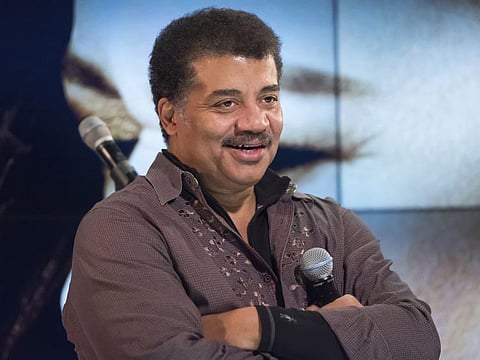Neil deGrasse Tyson slammed for El Paso tweet
His desire, he said, was to provide ‘objectively true information’

Critics say deGrasse Tyson should ‘stick to astrophysics’ after tweets about shootings
On Sunday, astrophysicist Neil deGrasse Tyson offered his perspective on mass shootings in El Paso, Texas, and Dayton, Ohio, that left 31 people dead and scores more wounded.
His desire, he said, was to provide “objectively true information.”
But, as the astrophysicist and narrator of National Geographic’s ‘Cosmos’ later acknowledged, timing is everything.
“Often, our emotions respond more to spectacle than to data,” Tyson wrote in a Sunday tweet comparing the weekend tragedies to other common ways people die.
Among his examples were medical errors and car crashes, which Tyson noted will cause hundreds of casualties in any given 48 hour period.
The backlash was swift, and many found Tyson’s tweet ill-timed and devoid of empathy. Though Tyson called the shooting horrific, thousands of people had flocked to his Twitter account to show their disapproval.
“To call this disappointing from someone as smart as @neiltyson is a massive understatement,” one user wrote. “Can we not strive for fewer medical errors AND fewer mass shootings at the same time? Can we not want a better flu shot AND fewer gun deaths? Be better than this, Neil.”
Tyson attempted to clarify his stance in a Monday afternoon Facebook post, titled “TweetStorm”.
The “largely preventable” causes of death he’d enumerated the day prior, he said, was an effort to “offer objectively true information that might help shape conversations and reactions to preventable ways to die.”
He also reiterated his original point: the general public tends to react with great fervour to “spectacular” incidences of death, while more typical deaths garner a less-emphatic reaction.
“Where I miscalculated was that I genuinely believed the tweet would be helpful to anyone trying to save lives in America,” he wrote. “What I learnt from the range of reactions is that for many people, some information — my tweet in particular — can be true but unhelpful, especially at a time when many people are either still in shock, or trying to heal — or both.”
Tyson’s sardonic, facts-above-all personality has rubbed people the wrong way in the past — and he’s received a reputation for gleefully pointing out the scientific flaws in movies, songs and other things people generally enjoy.
“I personally value knowing with precision and accuracy what reaction anything that I say (or write) will instill in my audience,” he wrote. “And I got this one wrong.”



